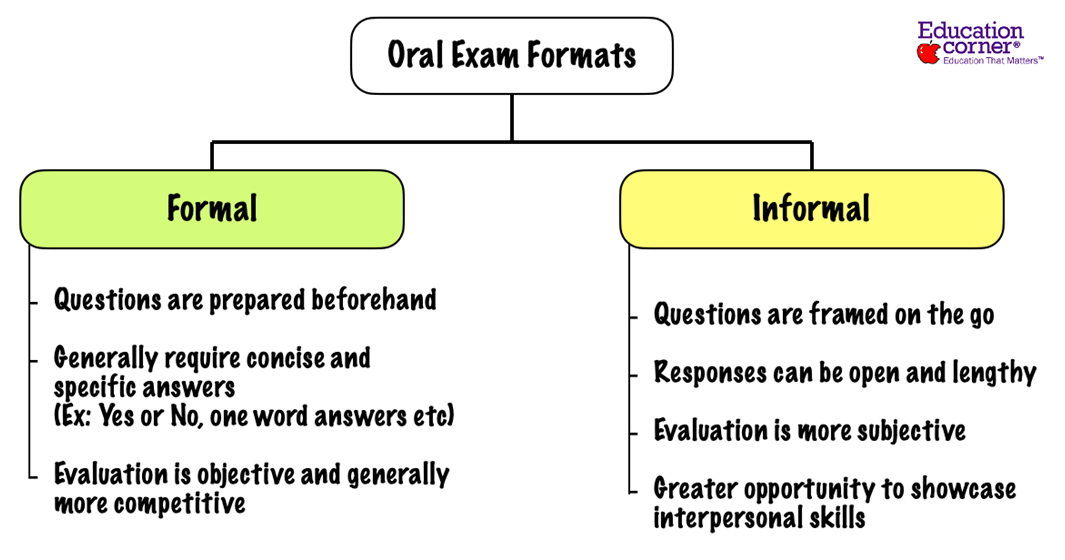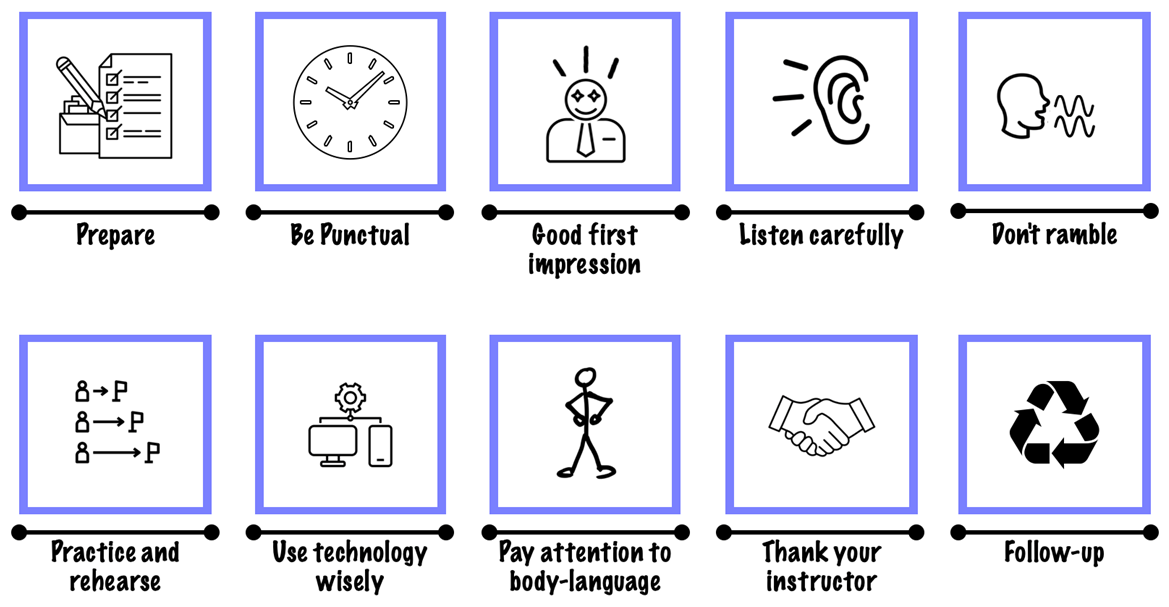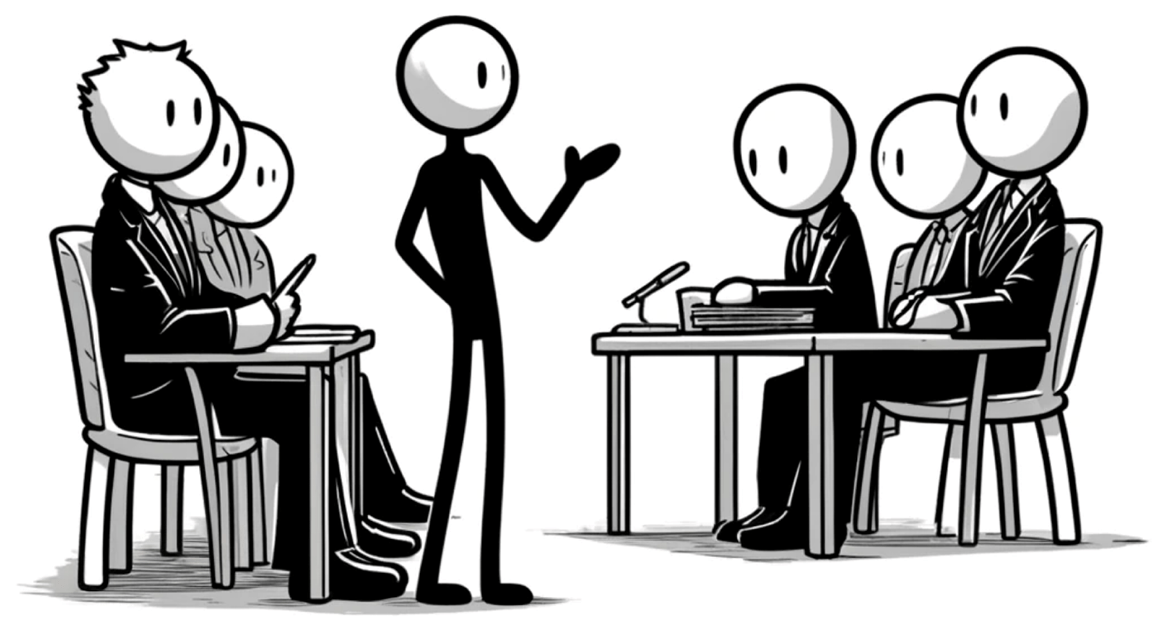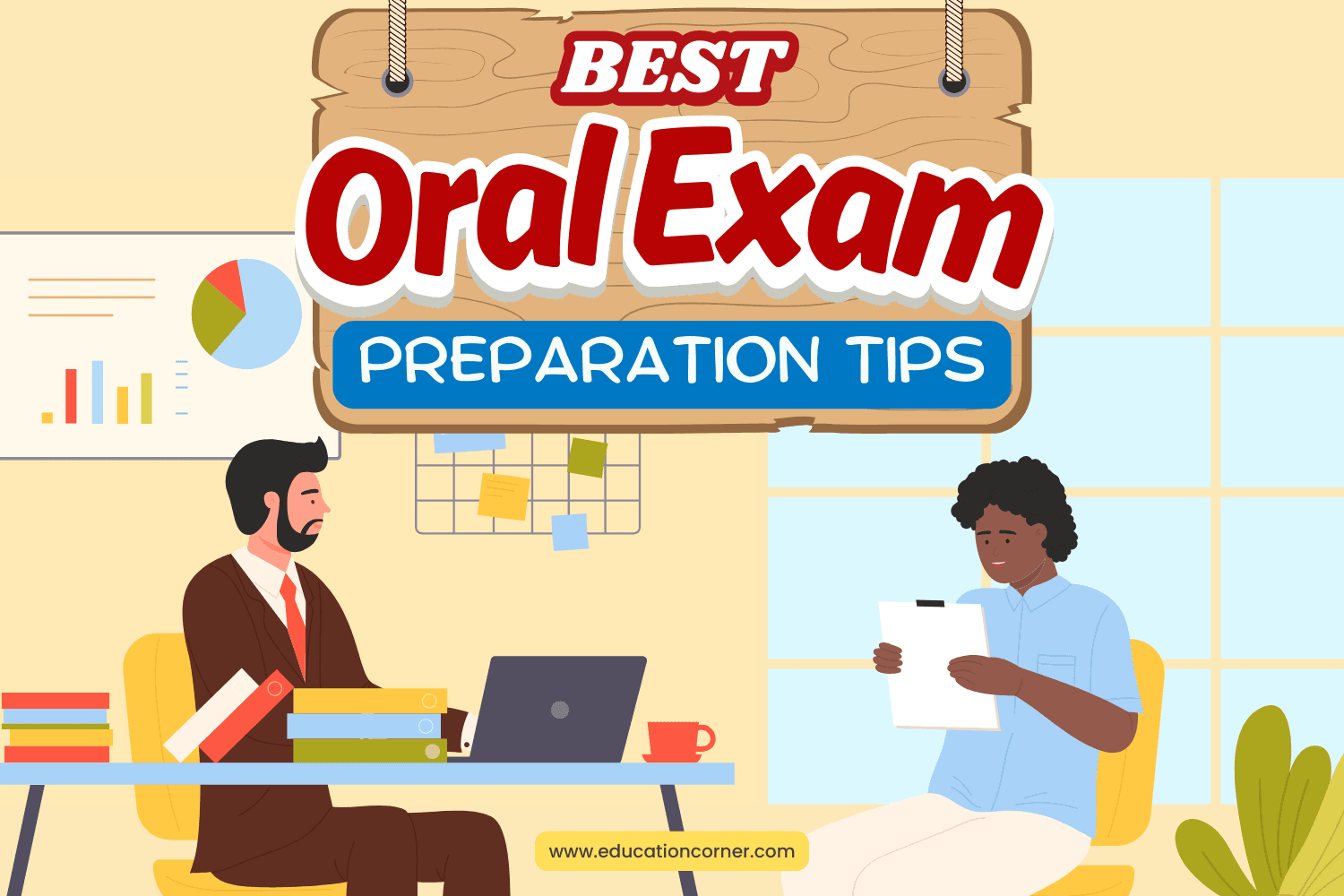Oral exams provide a wealth of information compared to their written counterparts. They provide teachers the opportunity to probe into students’ explanations and obtain a more complete picture of their understanding.
If you are a student taking an oral exam, you have the chance to showcase not only your knowledge and mastery of a subject but also your presentation, speaking, and interpersonal communication skills.
Oral exams generally come in two formats: Formal & Informal:

Formal oral exams follow a structured format with a list of questions prepared beforehand. They typically seek concise, specific answers and are more competitive in nature.
Informal oral exams are less structured and permit students to provide more open and lengthy responses. Because they do not require a specific answer, evaluations are often more subjective. They also allow participants to showcase their interpersonal skills, such as communication and presentation.
Regardless of the format, both demand careful listening and clear, concise responses.
Oral exams can be intimidating without proper preparation. The following proven strategies will help you prepare well and ace your next oral exam:

Prepare
Like any other test, the key to acing an oral exam is preparation. Here are some tips to prepare well:
Know the format and expectations
Ask your teacher or review the syllabus for this information. If possible, look for sample questions or inquire about past exams. Find out if:
- Is it a formal or informal exam?
- How long will it last?
- What topics will it cover?
- What criteria will be used to evaluate your performance?
- Can you use visual aids and other teaching materials?
- Is there a dress code?
Knowing the format and expectations will help you plan your study time, focus on the most relevant material, and anticipate possible questions or scenarios.
Review and organize your notes
This includes your notes from class, readings, homework, and discussions. Summarize and synthesize your notes.
Make outlines, flashcards, mind maps, and diagrams. Highlight and underline the main points, key terms, definitions, examples, or arguments. This will help you recall and understand the content, identify the gaps in your knowledge, and reinforce your memory.
Make sure you spend adequate time studying.
Learn to manage your anxiety
It is important to manage your anxiety before and during the exam. Use breathing exercises, positive affirmations, visualization, relaxation, or meditation techniques.
Prepare mentally and physically. Prior to the exam, make sure you get enough sleep. Eat well, drink water, avoid caffeine, and dress comfortably. Managing your anxiety will help calm your nerves, reduce stress, and enhance your performance.
Be punctual
Never arrive late for an oral exam. Be sure to confirm the exam’s date, time, and location well ahead of time. If you arrive late, your teacher may view you as unreliable, irresponsible, and lacking in integrity. This may cause the teacher to test you more strictly, resulting in a lower test score.
Give a good first impression
Your oral exam begins the moment you walk in the door. Enter the room smiling, look interested, pay attention to your instructor, and introduce yourself.
Be polite and respectful to your examiner, instructor, or audience by greeting them, thanking them, addressing them by name or title, and avoiding interruptions or distractions.
You should look and act professionally. Dress appropriately for the type of oral exam you’re taking, and always turn off your mobile phone.
Listen carefully, Interpret effectively
Oral exams are not all about talking – to succeed, you need to be good at listening, too. Listen carefully and follow the instructions given. If a question is unclear, ask for clarification.
Pay attention and remain focused throughout the exam.
Good listening skills involve hearing and deriving meaning from the question. You should understand what you hear and let your mind interpret it as quickly as possible to process the appropriate answer.
And if you don’t know the answer, say so, but be direct and stay on topic. Always follow the time limit and the order of the questions.
Don’t ramble
Many students struggle to communicate clearly and directly, often resorting to rambling. Fortunately, with the right mindset, this can be addressed.
It is common to think that oral examiners are there to trick or intimidate you; however, they only want to ensure that you are ready to study more difficult topics. Take a few seconds to gather your thoughts before diving straight into the answer.
If it helps, memorize a few template sentence patterns. For instance, start off your sentence with “So…. in terms of XYZ…”. Try to avoid phrases like Uhm, uh…and such.
It’s okay if you don’t immediately know the answer.
Frame your thoughts and outline a methodology to find an answer or solve the problem. Be direct, stay on top, and answer questions thoroughly but concisely. Avoid mumbling or speaking in a monotone voice. Do not rush through the test or alter your voice tone.
Practice and rehearse
Practice and rehearse your answers or presentation alone or with a partner. It’s best if your partner is familiar with the terms and concepts that could appear on the test. A student who has already taken the test or a tutor could help.
Create possible questions and try to answer them. Use a timer, a recorder, or a mirror. Ask for feedback from your partner, instructor, or peers. This will prepare you for what could appear in the test and help you improve your speaking skills, confidence, fluency, accuracy, and delivery.
Practice answering different questions – factual, analytical, evaluative, or hypothetical. Also, practice using clear and concise language, appropriate tone and volume, eye contact, gestures, and pauses.
If possible, do a trial run with your teacher to get feedback.
Use technology wisely
If you intend to use an overhead projector, computer, or mobile device, ensure it works properly before you take the test. Here are some tips for using technology to enhance oral presentation:
Choose the right software
Many options, such as PowerPoint, Keynote, Prezi, Google Slides, and Canva, help you create visually appealing and engaging slides. You must select the right one based on your purpose, audience, features, compatibility, and accessibility.
Some software may allow you to embed videos, audio, animations, or interactive elements, while others may require downloading or exporting your presentation in a specific format. Know this beforehand.
You should also check the availability and reliability of the software and the internet connection before you present and have a backup plan in case of technical issues.
Technology can greatly enhance your oral presentation but can also become a distraction. Don’t use technology unless it enhances your presentation; don’t go over the top. Your oral presentation should showcase you, not the projector or your new iPad Plus.
Design your slides effectively
Your slides must support your message, not distract from it.
Follow basic principles of slide design, such as using a clear and consistent layout, choosing a readable font and color scheme, limiting the amount of text and bullet points, using relevant and high-quality images and graphics, and avoiding unnecessary transitions and effects.
You should also use software to check your spelling, grammar, and punctuation and ensure that your slides align with your brand identity and style guide.
Practice and record your presentation
Practicing your presentation will help you improve your fluency, clarity, and confidence and identify and correct any mistakes or gaps in your content.
Record yourself using your webcam, microphone, or screen recorder, and then watch and listen to your performance.
You can also analyze your voice, pace, tone, volume, and pauses and get feedback on your body language, eye contact, gestures, and facial expressions. Apps or software such as Voice Analyst, Speech Timer, Loom, or Screencastify help you with this process.
Pay attention to your body language
Your body communicates as well as your mouth, so you must not contradict yourself. Our body language is the sum total of all the signs we give off when communicating, including gestures, posture, eye contact, and more.
When mixed with words, body language can either enhance our message or confuse (or even shut down) our audience. Hence, attention to body language is crucial to succeeding in an oral exam.

Your body language should be deliberate. It must exude confidence and communicate that you’re happy to be there. Here are some tips for improving your body language:
Posture
How we hold our bodies is an important part of our body language. It can convey a person’s feelings and hint at whether they are confident, open, or submissive.
Avoid the following postures:
| What to avoid | Why to avoid |
|---|---|
| Folding your arms across your chest | Disconnects you from your audience. |
| Clasping your arms behind your back | Comes off as aloof. |
| Resting your hands on your hips | Appears matronly. |
| Folding your arms down in front of waist | Appears as a ‘goody-goody’. |
| Rocking back or forth or swaying | Appears nervous, anxious, or restless. |
| Putting hands in pockets or hiding them | Decreases trust; visibility of hands builds trust. |
| Fidgeting with objects | Communicates nervousness to the audience. |
| Pushing glasses back constantly | Suggests discomfort or nervous habit. |
| Not keeping appearance clean and kept | Non-verbal cue of unprofessionalism. If you have long hair, make sure it’s out of your face and not covering your eyes. |
| Checking your watch constantly | Implies impatience or lack of engagement. Use the clock in the room or alternatively, set your watch on the lectern or table. |
| Drumming fingers | Distracting and signals nervousness. |
| Facing away from the audience or teacher | Hinders voice projection and audience engagement. If you must write on a flip chart or board, finish writing and then speak facing the audience. |
Walking
It’s a myth that every presenter should stand still, feet shoulder-width apart, and speak—almost like a statue. You will see that some of the best presenters, including TED Talk speakers and CEOs at keynote speeches, walk around the stage with confidence and natural energy.
As human beings, it’s not in our nature to stand still. Hence, walking a little is okay when presenting or speaking in an oral exam. In fact, controlled walking can enhance your presentation.
Remaining in just one spot will make you appear rigid or nervous. Walking requires the audience to focus on you, which keeps them interested in what you’re saying. This leads to increased engagement.
But don’t pace, as it can be very distracting.
When presenting, walk slowly between key talking points. Shift your position on the stage when you are talking about the less important details. Use movements to punctuate your statements and stop to make an impact.
Practice matching your movements with your presentation slides in the background so your audience isn’t distracted.
Use the Podium (or Lectern)
Using a Lectern is a skill that presidents and prime ministers take seriously. As a student, if you have to use one during your oral exam, then remember the following tips:
- Understand your speaking environment—where will you be speaking? Is there a lectern? If possible, practice speaking behind. Get comfortable with the space and how you’ll interact with any notes or materials you have.
- Develop a comfortable hand position—when you’re not gesturing, determine a natural resting position for your hands. This can be gently resting on or loosely holding the sides of the lectern so your hands can be seen. This helps you appear relaxed and confident.
- Practice effective use of notes: If you need to use notes, prepare them in a way that supports quick glances rather than prolonged reading. Highlight key points or questions you expect to address and organize them clearly so you can easily find your place.
- Incorporate movement naturally: If you don’t need your notes or microphone, move slightly away from the lectern to engage more directly with your audience. This can make your presentation feel more personal. Ensure that such a movement is purposeful and not distracting.
- The main goal here is to avoid doing anything with your body that distracts your audience from what you are saying. Remember, if you act uncomfortable, those listening to you are going to feel uncomfortable.
Getting your body language right is an important component of public speaking. It takes some practice to become good at it. Prepare for the test by practicing in front of a mirror. You can also make an audio recording to evaluate your speech.
Focusing on these aspects will help you become confident and deliver a more engaging oral exam presentation.
Thank your instructor
Your oral exam is not over until it’s over. And part of it being over is taking a moment to thank your teacher or audience. Express gratitude – by doing so, you demonstrate appreciation for the chance you were given to showcase your knowledge and skills.
Be prompt and specific about what you are grateful for.
If you receive feedback, let them know how it will help you improve. If time permits, outline specific actions based on the feedback. This shows the evaluator that you value their assessment and are dedicated to your own development.
Follow-up
After the oral exam, sit down and take a moment to reflect on your performance.
- What did you do well?
- What did you do poorly?
- How could you do better next time?
If you have an issue with the material presented, questions, or your evaluation, speak to your teacher, but do not be confrontational or challenge their opinion.
While it may be tempting to dwell on any mistakes, focus on the positives and what you learned from the experience.


It was very help full . I have learned a lot. Thank you so much